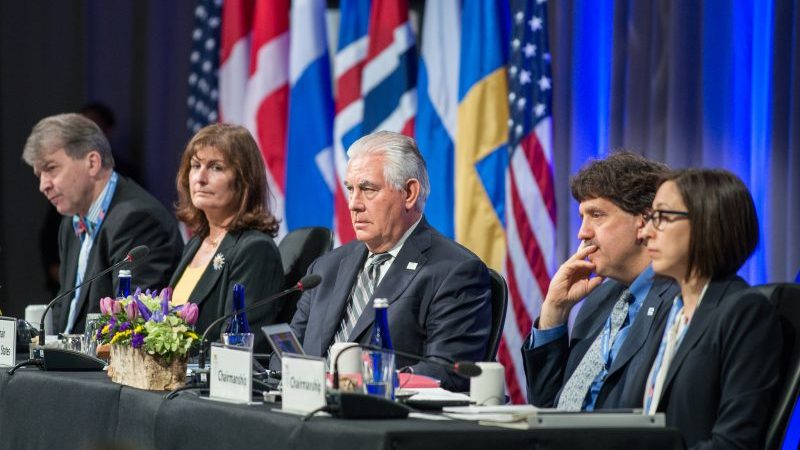The US has endorsed global action to reduce greenhouse gases and short-lived climate pollutants, at a meeting of the Arctic Council.
Secretary of state Rex Tillerson signed a declaration along with seven other foreign ministers in Fairbanks, Alaska on Thursday.
The statement merely noted the entry into force of the Paris climate deal. The Trump administration has yet to decide whether to continue US participation or quit the agreement.
International declarations signed by the previous administration, such as the 2016 G20 leaders communique, went further, recommitting to pledges made under the accord.
But the expression of support for a key objective of the deal, to curb emissions, goes further than the holding statement the US offered at a recent G7 energy ministerial.
It came alongside an agreement to enhance scientific cooperation in the region, which is warming at twice the global average rate.

Excerpt of the Fairbanks declaration
David Waskow, international climate director at the World Resources Institute, welcomed the statement. He said: “If anyone had doubts about the urgent threat of climate change, this communique endorsed by the entire Arctic Council – including the United States – must set them to rest.
“I find it very encouraging that the council acknowledged that global action is necessary to address this global challenge. That is exactly why the Paris Agreement, which the communique highlights, is so important.”
Weekly briefing: Sign up for your essential climate news update
Retreating ice is, paradoxically, opening up previously inaccessible areas of the Arctic for oil exploration. That oil, when burned, will drive further global warming.
In one of his last acts as US president, Barack Obama sought to block offshore drilling in the Arctic. His successor Donald Trump has signed an order to overturn the ban.
At present, the main barrier is economic: oil prices hovering around $50 a barrel may not be sufficient to justify ventures into what are still hostile, icy conditions.
Shell halted its activities in Alaska’s Chukchi Sea in 2015 after a controversial $7 billion investment failed to strike significant reserves. A spokeswoman for the oil major told Climate Home its position had not changed since then.
Meanwhile Norway, which full-throatedly endorses climate action, is most vigorously expanding oil exploration northwards.
Statoil is set to drill five wells in the Barents Sea, starting this month. Thanks to the Gulf Stream, the area in question is ice-free and the state oil company claims it can operate there safely and at a competitive cost.
Investigative news site Greenpeace Energydesk challenged that claim this week, with the revelation safety breaches at Statoil increased last year. It identified 14 major incidents including four gas leaks, two fires and an oil spill, occurring as the company cut more than a hundred jobs in health, safety and environment.
Environmental groups Greenpeace and Young Friends of the Earth are suing the Norwegian government to block all oil exploration in the region, arguing it is incompatible with international climate goals.
